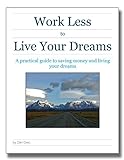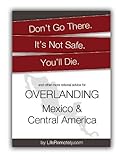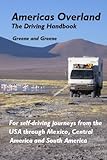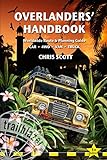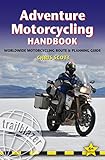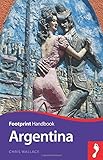Difference between revisions of "Argentina"
(→Price) |
|||
| Line 94: | Line 94: | ||
Last updated: April 2011 | Last updated: April 2011 | ||
==Price== | ==Price== | ||
| − | <priceControls/> | + | Currency and unit to display: <priceControls/> |
===Northern Argentina=== | ===Northern Argentina=== | ||
{| class="wikitable" border="1" | {| class="wikitable" border="1" | ||
Revision as of 14:13, 29 October 2011
Currency to display:
Contents
At the border
Correct as of: 28 November 2010
Required Paperwork
- Passport of registered owner.
- Drivers license of registered owner.
- Original vehicle registration.
- Proof of vehicle insurance.
(no copies are required)
Process at border
- The owner of the vehicle gains entry at immigration (migración), including a stamp in their Passport.
- The owner must show the new passport stamp, drivers license the original vehicle registration to customs (aduana)
- The owner is issued a temporary import permit for the vehicle.
Note: Customs may ask for proof of vehicle insurance before entry is granted.
Cost of entry
Free.
Permitted length of stay
Typically valid for 30 or 90 days, at the discretion of the customs officer.
Extension of stay
The only way to achieve this is to leave Argentina with the vehicle and return. This can be done at any bordering country, all in one day, without problems.
Storing a vehicle and temporarily leaving the country
(unknown)
Describe if/how a vehicle can be stored, and for how long.
Also mention if the owner / temporary importer can leave the country while the vehicle is in storage.
Exiting with a vehicle
- The registered owner presents the temorary import paper to customs.
- The registered owner is stamped out of Argentina at immigration.
Overland Essentials
Vehicle Insurance
Insurance requirements
Insurance is mandatory, and must specifically cover Argentina.
It's common for customs officers to ask for proof of insurance before entry is granted.
Cost of insurance
Something around $200.00 ARS per month for a 4x4.
Where to purchase insurance
Larger cities have insurance offices where it can be purchased.
When buying from a large, international insurance company it's possible to also get coverage for Chile, Brazil, Uruguay and Paraguay on one policy which makes it cheaper.
Driving license
Technically an International Driving Permit is required.
In reality, showing a license from anywhere in the world seems to be good enough.
Driving side of road
Right.
Right hand drive vehicles are permitted without problem.
Mandatory items in vehicle
None.
Roads
General Road quality
Roads in Argentina are typically of very good quality. Almost all highways are sealed and two lanes.
Line markings and hazard signs are almost always present.
One way streets are extremely common in towns and cities, and almost always well signed.
Road signs
Highway road signs with distances and directions are typically very clear and consistent.
Within towns and cities, almost all streets are clearly signed.
Toll roads
Toll roads are not common, though the larger highways and freeways around the countries' biggest cities are tolled.
Prices are typically in the 5 pesos range, and toll booths come up ever 50 - 100km.
Bribery
Bribery is not common in Argentina, though it does happen. Do not assume a Police officer is trying to bribe you, as he may take offense, making the situation worse.
See the bribery tips page for advice.
Checkpoints
Two kinds of checkpoints are common in Argentina.
- Police / Military checkpoints.
Police may ask for your drivers license, Passport, original vehicle registration and the temporary import permit issued by customs when you entered Argentina. The Police are often friendly and polite.
- Agricultural checkpoints.
Argentina is serious about stopping the spread of fruit fly and other agricultural problems, so checkpints are common (especially in the North-West). Many types of fruit are banned and you will have to surrender them.
Traveling with pets
(unknown)
List the entry requirements and anything else required to travel with a pet.
Gasoline / Petrol / Diesel
Last updated: April 2011
Price
Currency and unit to display:
Northern Argentina
| Gasoline Grade | Price |
|---|---|
| Normal (very rare) | $4.00 ARS per Liter |
| Super | $4.42 ARS per Liter |
| Premium | $5.21 ARS per Liter |
| Ultra Diesel | $3.57 ARS per Liter |
| Diesel Euro (low sulfur) | $5.48 ARS per Liter |
Southern Argentina (Patagonia)
Due to heavy government subsidies, gasoline is cheaper in the South.
| Gasoline Grade | Price |
|---|---|
| Normal (very rare) | $3.30 ARS per Liter |
| Super | $3.44 ARS per Liter |
| Premium | $4.14 ARS per Liter |
| Ultra Diesel | $3.15 ARS per Liter |
| Diesel Euro (low sulfur) | $4.18 ARS per Liter |
Gasoline Availability / Frequency
During summer vacation (Jan->Feb), gas shortages are not uncommon, especially in the rural areas of the South. Purchase gas whenever you can. Typically gas stations are not more than 200 - 300km apart, though on Route 40 the distance can be more. Shortages will also increase this distance.
Gasoline Quality
Gasoline is considered to be clean, and ultra-low sulfur diesel can be purchased at most stations.
External information about gasoline
(unknown)
Link to external websites with price & quality information, if available.
Safety / Security Considerations
Driving at night
Argentina is considered a safe country by South American standards, and there is no reason to specifically avoid driving at night.
Vehicle parking
During the day it's usually OK to leave vehicles on the street and in store parking lots.
At night, it's preferable to pay for a fenced parking lot, which might cost $5.00 ARS to $10.00 ARS
Special driving considerations
None.
Security advisories and information
- Country Specific Information - U.S. Department of State
- Travel Reports and Warnings - Foreign Affairs and International Trade Canada
- Travel advice by country - Foreign and Commonwealth office (U.K.)
- Travel Advice for Argentina - Australian Department of Foreign Affairs and Trade
Camping
Camping is a national past-time in Argentina, and so organized camp grounds are extremely common. Even the smallest towns are likely have a campground, and they can fill up with loud and friendly Argentinians during the summer months. Common facilities include hot showers, flush toilets, wash basins and a table and chairs and fire put in each camp site.
They typically cost $15.00 ARS to $30.00 ARS per person, per night.
Roadside camping is common, especially in the South where the population density is low.
Most Overlanders consider it OK, use you own discretion.
Camping guide books
The Firestone Atlas de Rutas (Road Atlas) clearly shows campgrounds and lists addresses and phone numbers.
Drinking water
In virtually all of Argentina the tap water is safe to drink. Ask a local to be sure.
Paper maps
- Firestone produce the Atlas de Rutas (Road Atlas) which is equal in content and quality to maps anywhere in the world. It contains detailed color maps of every province and zoom-ins of all cites and larger towns. It also indicates campgrounds, hotels, gas stations, and parks and contains basic maps of all bordering countries (Chile, Brazil, Uruguay, Paraguay and Bolivia). It can be purchased from bookstores throughout the country for around 45 pesos. A new edition is printed each year.
- The Automobile Association of Argentina (AAA) also sells good quality "highway" maps at many gas stations, and their offices located in bigger cities.
GPS
- Open Street Map: Appears to have good coverage.[1]
- Garmin: Lists coverage as "Most urban areas with intertown roads".[2]
- TomTom: List coverage as "46% of Argentina".[3]
Directions and GPS co-ordinates for camping, propane, gas, repairs, etc.
- Camping Sites: Argentina North, Camping Sites: Argentina South - Detailed list of campsites and propane filling with description, directions and GPS co-ordinates. Some at hotels (lists facilities and price), some roadside and free.
- Campsite Listing - South America | PanAm Notes - List of campsites, with directions and GPS co-ordinates. Some at hotels (lists facilities and price), some roadside and free.
- Andes Expedition camping Locations - List of campsites, with basic directions and GPS co-ordinates. Mostly free sites.
- Camping Log 2: South America - List of campsites, shopping, fuel, propane and border crossings with excellent descriptions and GPS co-ordinates.
- Hackney Travel SA Waypoints - Raw GPS data (in gdb or gpx format) for waypoints (including campsites, fuel, repairs, propane and more)
- The Silk Road Motocaravan Network - Raw GPS data for waypoints (camping, gas, propane, points of interest and more)
Overland Travel Interest
Special Overland interests
- Many Overlanders make the long drive South to Ushuaia in Tierra Del Fuego, the Southern-most city in the world, and the end of the Pan American Highway. Getting there requires crossing through Chile and catching a ferry, but the process is not difficult.
- Argentina has an excellent system of National Parks. Entry can be as high as 80 pesos per person. There is no "country-wide" card that can be purchased.
- Many people are drawn to the famous National Route 40
Guide Books
Vehicle Maintenance
List Garages &/or dealerships for major vehicle manufacturers (including motorbikes).
Trusted mechanics can also be listed here.
Buying and selling vehicles
Buying a vehicle as a foreigner
Vehicles with Argentinian papers can be purchased by a foreigner without difficulty.
A vehicle with Argentinian papers can not be driven out of Argentina buy a foreigner, even when they are the registered owner. This rule is strictly enforced at the borders.
Selling a foreign-plated vehicle
Due to Argentina's very strict importation laws and high taxes, this is a very difficult process, and requires a lot of time.
First, options that are possible, but not appealing:
- It's possible to import the vehicle legally and sell it as a regular Argentinian vehicle. The tax rate is 100% of the listed value of the vehicle (which is almost certainly many times the original purchase price), making this prohibitive. It will take months of paperwork also.
- It's possible to have the vehicle declared "destroyed" or "damaged beyond repair" and leave it on the side of the road or with a mechanic. The original import papers will be legally cancelled and you will be free to leave the country. You will not get much money for the vehicle (if any).
Second, it *is* possible to transfer the paperwork to another foreigner, given the right conditions.
(Note: many have tried, and none have successfully sold to an Argentinian using the following methods, the buyer must be a non-resident foreigner)
- Go to a Public Notary (Escribano Publico) and have a Power of Attorney (Poder) made authorizing the buyer to drive the vehicle in Argentina and all countries for an unlimited time period.
- Go to a customs office (or leave Argentina) to cancel the current temporary import papers and have new ones made in the name of the new owner.
- The new owner can now drive the vehicle in Argentina for as long as the temporary import papers allow. They can also leave and re-enter as many times as they like to get new papers, and they can drive to any other country they wish. The original owner can now legally leave Argentina.
NOTE: It's preferable to re-register the vehicle in the name of the new owner in the home country/state of the vehicle, so the original owner is completely free and clear of all responsibility. In some cases, this may not be possible as the new owner may not live in the country the vehicle is actually registered. If the vehicle remains in the name of the original owner, the new owner should have no problems driving and entering/exiting countries as long as they have the power of attorney with them at all times.
Third, there are reports of selling the vehicle to an Argentinian that owns a farm and doesn't care about legal Registration. Reports say you should be able to leave Argentina without problem, but it is unknown if problems will arise if you ever return. This option is clearly illegal and not recommended. Use this information at your own risk.
References
Helpful External links
- Argentina: Visa and Passport requirements | World Travel Guide
- Health Information for Travelers to Argentina - Center for Disease Control and Prevention
- Argentina travel guides at wikivoyage
- Argentina - Wikipedia, the free encyclopedia
Insert non-formatted text here

